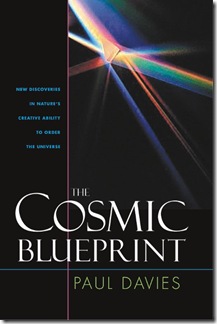Is a creative force at work in the universe? Physicist and Templeton Prize laureate Paul Davies thought so when he wrote The Cosmic Blueprint in 1988, now being reissued in paperback. Davies is an excellent writer and any reader will learn much from this book.
In recent years, Davies has been joined by many other scientists and theologians in pursuing a common theme, that the data from physics, cosmology, and biology cannot be understood by purely "reductive" processes and some additional, holistic process, natural or supernatural, is strongly suggested.
Davies notes that, according to modern cosmology, our universe, in some sense, emerged at the Planck time (10-43 seconds into the big bang) from a state of complete disorder. That is, the universe began at this point with no structure or organization. This has theological significance, which Davies does not sufficiently emphasize. If the universe had no structure at some point in the past, such as the Planck time, then any present structure cannot have come from before that time. The present highly textured universe cannot have resulted from a "built-in" plan present at the Planck time. There is no "cosmic DNA" present at the conception of the universe to guide its future development. The complete absence of such a preordained plan after the appearance of the universe, suggests that even if God created the world, that world has no memory of his intentions in doing so.
In Davies' view, since the Planck time, some unidentified creative force has acted continuously to bring about the increasing order and complexity that characterizes our present universe. He presents as evidence the developments in chaos, complexity, and self-organization that were relatively new and encouraging in 1988, but have generally failed to live up their promise as possible generators of cosmic order. As considerable research since then has shown, highly ordered and complex phenomena arise simply and naturally from the same, basic, reductionistic processes, that account for all other phenomena. Structure has been seen to self-organize by the mechanisms of physical law, chance, and selection. The much-desired holistic, order-generating, force has not yet shown its face.
Davies acknowledges that no law of physics, including the second law of thermodynamics, is violated by the natural evolution of order from disorder in thermodynamically open systems. All he can do is fall back on the something vaguely reminiscent of the god of the gaps: We don't know exactly how something happens, so it must happen by way of some previously unknown force. He ends by claiming, "The impression of design is overwhelming." That may be what people want to hear, but it is not my impression or that of most scientists viewing the same data. Indeed, I find overwhelming the impression of lack of design, from the cosmos as a whole on down to life on Earth. As Richard Dawkins has so eloquently put it: "The universe we observe has precisely the properties we should expect if there is, at bottom, no design, no purpose, no evil and no good, nothing but blind pitiless indifference."
http://rapidshare.com/files/118967297/kitap22.rar (1898 KB, şifre: 22kitap10946)




1 comment:
where can I get Paul Davies' 'The Origin of life' ebook?
Post a Comment